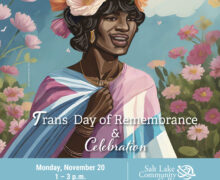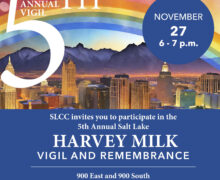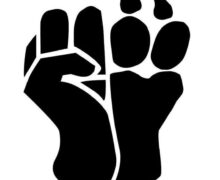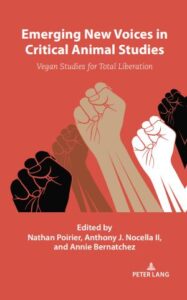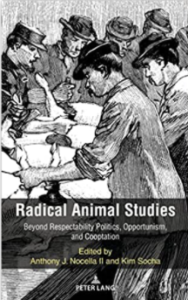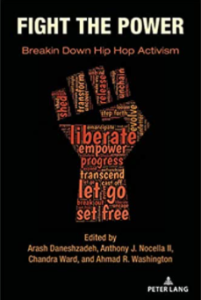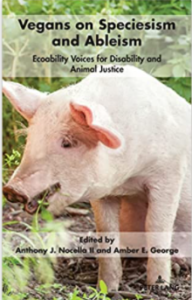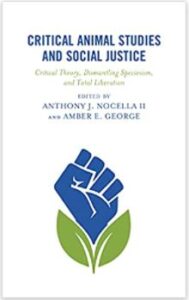November 18th, 2022 – 22nd Annual North American Conference for Critical Animal Studies
22nd Annual North American Conference for Critical Animal Studies
November 18th, 2022
Free, Public, Recorded, and via Zoom
Please click the link below to join the webinar:
https://slcc-edu.zoom.us/j/86923247927?pwd=YUxtYWM3TEVKNW0wNXFxbmFyZVQ4Zz09
Conference Chairs:
Daniel Salomon and Laura Schleifer
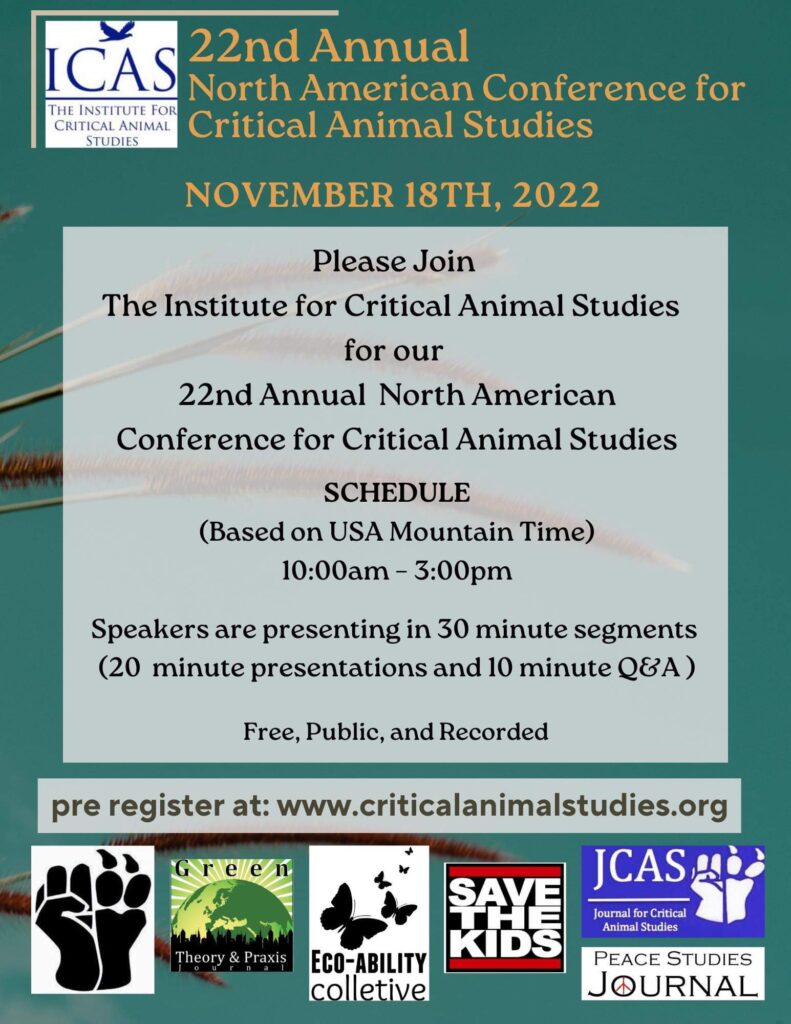
All Speakers have 20 minutes to present with 10 minutes of questions and comments.
SUBMIT
All submissions for the conference need to hold to the mission and principles of CAS and ICAS and to submit in a Word Doc. as an attachment in an E-mail with the following information:
1. Title of Presentation
2. Biography third person 80 to 100 words one paragraph
3. Description/Abstract of the presentation around 200 words third person and one paragraph
SEND SUBMISSION TO: NYartivist@gmail.com
SCHEDULE
(Based on USA Mountain Time)
10:00am – 3:00pm
10:00am-10:10am – Welcoming and Introduction
Biography: Laura Schleifer is the Institute for Critical Animal Studies Director of Regions and Total Liberation, Program Director at Promoting Enduring Peace, Vision Council member of the UK-based Plant-Based Health Justice, and co-founder of Plant the Land, a Gaza-based vegan food justice/community projects team. A lifelong “artivist” and NYU Tisch School of the Arts graduate, she’s performed throughout the Middle East with a circus troupe, taught in China, Nicaragua, and at Wesleyan University’s Green Street Arts Center, performed off-Broadway, and arts-mentored homeless youth. Her screenplay, The Feral Child, was a Sundance Screenwriters’ Lab finalist. Her essays appear in New Politics Magazine , The Leftist Review, Project Intersect, Forca Vegan, The New Engagement, Kropotkin Now! Life, Freedom and Ethics (Black Rose Books, 2021), Neoliberal Schooling of Selfishness and Exploitation: Rubricization and Corporatization of Higher Education, (Peter Lang, 2022) and Fever Spores; William S. Burroughs and Queer Letters, (Rebel Satori Press, 2022).
Biography: Daniel Salomon is a third-year PhD Student in Urban Studies at Portland State University (PSU). Salomon has a Master of Arts in Theological Research from Andover Newton Theological School (Andover Newton at Yale Divinity School) along with a Graduate Certificate in Science and Religion from the Boston Theological Institute. Salomon holds a BS Cum Laude in Liberal Studies from Salisbury University in Maryland, minoring in Biology, Environmental Studies, and Conflict Analysis/Dispute Resolution, as well as a Naturalist Certificate from the Au Sable Institute of Environmental Studies. Salomon’s research specializations in Urban Studies are Environment and Critical Autism Studies. Salomon is a 42-year old autistic adult.
10:10-10:30am – Dan Fischer, “All Land Back, All States Smashed!”
Bio: Dan Fischer is a middle school social studies teacher who has several academic degrees, but is prouder of his political arrests and even prouder of the times he didn’t get caught. He’s an editorial board member of New Politics and a volunteer with Food Not Bombs.
Abstract: Examining synergies between decolonization and anarchy, and building on engagements with anarcha-indigenist theorizations and Potawatomi campaigners, this presentation urges anarchists to concretely aid and participate in Indigenous people’s movements for Land Back. Complicating anarchists’ demands to “reclaim the commons” or “occupy everything,” it argues against well-intentioned critiques which conflate Indigenous self-determination with coercive nationalism. It also explores how Indigenous peoples’ treaties with animal and human populations might point to models of transnational coexistence in a more anarchic future. In short, there can be no anarchy nor total liberation without returning all stolen land. If we want “all states smashed,” we must give “all land back.” And vice versa.
10:30-10:40am Q and A
10:40-11:00am – Nathan Poirier, “Where Might Critical Animal Studies Go From Here?”
Biography: Nathan Poirier is a doctoral candidate in sociology at Michigan State University with graduate specializations in (critical) animal studies and women’s & gender studies, and previous master’s degrees in Anthrozoology and mathematics. Nathan has held co-leadership roles at the Institute for Critical Animal Studies, is co-director of Students for Critical Animal Studies, and is assistant editor for the Journal for Critical Animal Studies. He co-edited the book Emerging New Voices in Critical Animal Studies: Vegan Studies for Total Liberation (Peter Lang, 2022).
Abstract: This talk aims to expand the already broad conceptual horizon that makes up the organization and project of critical animal studies. ICAS was founded on the mission to “be in solidarity with, and be part of radical and revolutionary actions, theories, groups and movements for total liberation…”. This talk’s purpose has three primary reasons. One is that as times and the salience of various movements change, CAS must adapt to stay relevant. Two is that for the field to remain holistic and inclusive, it must constantly push itself into new territories and ideas through dialogue. And three, making new connections stays true to ICAS’s founding mission and ten principles. Speaking as the assistant editor of the Journal for Critical Animal Studies, Nathan provides his input as to what kinds of submissions JCAS would like to receive going forward. While CAS was created to be an all-encompassing organization, covering all types of oppression and liberatory efforts, there are some areas that remain largely or completely absent. Nathan will highlight some of these areas and provide reasons as to why JCAS would like to see more submissions on these various topics be sent to the journal.
11:00-11:10am – Q and A
11:10-11:30am – Brian Tokar, “Climate Justice and Community Renewal”
Biography: Brian Tokar is an activist and author, a lecturer in Environmental Studies at the University of Vermont, and a long-time faculty and board member of the Institute for Social Ecology. He is the author of The Green Alternative, Earth for Sale, and Toward Climate Justice: Perspectives on the Climate Crisis and Social Change, and he has also edited three volumes on biotechnology and food issues. His latest book is Climate Justice and Community Renewal (Routledge, 2020), an international collection on grassroots climate responses, co-edited with Tamra Gilbertson of the University of Tennessee and the Indigenous Environmental Network.
Abstract: The global climate crisis coincides with a crisis of biodiversity and an increasing awareness of what appears to be a sixth worldwide extinction event, comparable in many ways to the cataclysmic events that ended the Age of Dinosaurs some 66 million years ago. In response to these converging crises, people around the world are rising up to address the common root causes of these catastrophes and uniting around the theme of climate justice.
This presentation will review the current situation and profile a variety of radical, grassroots efforts to defend people’s land rights, protect water resources and halt the expansion of fossil fuel infrastructure. It will feature the perspectives of several international contributors to the recent edited book, Climate Justice and Community Renewal: Resistance and Grassroots Solutions, edited by Brian Tokar and Tamra Gilbertson and published by Routledge in 2020. The book features examples of local climate struggles and community renewal efforts from Latin America, India, Western and Southern, Africa, Europe, Canada and across the U.S. that share a commitment to Indigenous sovereignty, community self-reliance and the revolutionary outlook of social ecology.
11:30-11:40am – Q and A
11:40-12:00pm – Dayton Martindale, “Making Sense of the Harms of Mass Extinction”
Biography: Dayton Martindale is editor-at-large for The Barn Raiser, host of Storytelling Animals podcast, and a writer and editor on climate, environmental, and animal issues. His work has appeared in In These Times, Sierra, Truthout, Boston Review, Harbinger: A Journal of Social Ecology, The Next System Project and numerous other publications.
Abstract: Few disagree that a human-caused mass extinction would be devastating. But devastating for whom? A first, more anthropocentric view emphasizes the harms of mass extinction to humans, but does not worry about the rest of nature. Another, more biocentric perspective is concerned about the harms to nonhuman entities such as species and ecosystems, though not necessarily individual animals. In this talk, I will argue for a third, related view, showing how our understanding of mass extinction shifts if we integrate an animal liberation perspective concerned with the well-being and flourishing of individual animals. This integrated view, concerned with individuals as well as collectives, humans and nonhumans, helps more forcefully refute the anthropocentric argument. It also has concrete ratifications for how we respond to mass extinction, leading to different analyses of issues like zoos or de-extinction.
12:00-12:10pm – Q and A
12:10-12:30pm – Doris Lin, “How Animal Law Codifies Animal Oppression”.
Biography: Doris Lin is an animal rights attorney and the Director of Legal and Government Affairs for the Animal Protection League of New Jersey. Since the 1990s, she has worked with a wide range of animal and environmental groups, including the Animal Protection PAC, the Bear Education and Resource (BEAR) Group, the Humane Society of the U.S., the Animal Welfare Institute, the Massachusetts Department of Environmental Protection, and the U.S. Environmental Protection Agency. Lin is also a former chair of the New Jersey State Bar Association’s Animal Law Committee. In 2007, Lin represented the NJ Animal Rights Alliance and the Bear Education and Resource (BEAR) Group in a lawsuit against New Jersey, successfully invalidating the state’s bear hunting plan. Since 2012, she has been the Director of Legal and Government Affairs for the Animal Protection League of New Jersey. She holds a J.D. from the University of Southern California and a B.S. in Applied Biological Sciences from the Massachusetts Institute of Technology.
Abstract: While most people think of animal law as a set of laws designed to protect animals, at the core is codification of speciesism and oppression. Even for attorneys who practice animal law, the best we can hope for is to chip away at the oppression around the edges. We will discuss how laws protect certain animals in certain situations, but in the end, preserve the commodification, objectification, and exploitation of animals.
12:30-12:40pm – Q and A
12:40-1:00pm – Abundia Alvarado, “Worshiping Our Sacred Web of Abundance: The story of Mariposas Rebeldes and how we are carving space for anti-capitalist ways of being.“
Biography: Abundia Alvarado (she/her) is a Nahuatl-Chiricahua Apache [naa·Waa·tul Ah-pah-che] Trans femme migrant from Tenochtitlan [Teh-no-cheet-lan] (so called Mexico city). She is a community organizer for food autonomy, indigenous rights, lgbtq2s rights, and more. Currently she is working on mutual aid regional systems in the South of so-called USA; her primary focus is focused on her idea/ concept of “The Sacred Web of Abundance”, a funding philosophical, political and organizing tool for her organizing and life. She is the co- founder of the Atlanta Queer and Trans/GNC agriculturalist collective Mariposas Rebeldes and a very new Anti Scarcity Action foraging Collective that aims to focus on working on reconnecting, both personally and collectively, with the Atlanta Web of Abundance. She is also a member of the Weelaunee [Wee-law-nee] Coalition, a group dedicated to defending the Weelaunee Forest from destruction, stopping the construction of Cop City and rematriate Weelaunee Forest.
Abstract: Mariposas co-founders Abundia will recount the story of how Mariposas came to be, how it grew from a backyard garden to a collective actively trying to reshape and reimagine spaces in so-called Atlanta to resist capitalism, gentrification and displacement and to center Indigenous, Black and Latine folks.She will talk about Mariposas work in food experimentation and autonomy, gardening, creating anti-capitalist spaces and how Mariposas is not only a collective, but a root for its members and community to connect and reconnect with their cultures, their ancestors, the food they ate, and to build a connection with the lands they now live on and steward. Abundia will also share on her involvement, both as a collective member and as autonomous organizer, in various capacities in the almost two years battle to Stop Cop City and Defend South River Forest, which we call by her given Muscogee name, the Weelaunee forest. Abundia has been involved in a group called the Weelaunee Coalition, which has used cultural organizing to center Indigenous and Black folks, children, educators and students in the struggle to defend the forest. Mariposas Rebeldes has also created anti-capitalist spaces within the movement, borrowing from the last two years of anti-capitalist cultural organizing they have done in the larger so-called Atlanta. We will discuss the concept of Land Back and rematriation within this movement and city (and in general), why we have felt it is important to defend Muscogee land, and how important it is for all people to be aware and participate (wherever they are) in the movement to Stop Cop City, which, if built, would set a precedent as being the biggest police training facility in the country.
1:00-1:10 Q and A
1:10-1:30pm – Radical Animal Studies, Total Liberation, and Critical Animal Studies
Anthony J. Nocella II (Ant)
Biography: Anthony J. Nocella II, Ph. D., (Ant) (he/they) is the Executive Director and co-founder of the Institute for Critical Animal Studies. An award-winning author, community leader, and policymaker. he is also Executive Director of the Academy for Peace Education, Executive Director of Save the Kids, and Editor of the Peace Studies Journal. Nocella is grounded in the field of education, justice studies, juvenile justice, sociology, criminology, and peace and conflict studies. He is internationally known for his innovative, transformative, and intersectional collaborations among fields of study, organizations, scholars, and communities.Dr. Nocella has published more than fifty scholarly articles or book chapters, co-founded more than ten active organizations and serves on four boards. He has founded five book series and co-founded four journals – Green Theory and Praxis Journal, Peace Studies Journal, Journal of Critical Animal Studies, and Transformative Justice Journal, and has published more than fifty books in sixteen different presses.
Abstract: This presentation will discuss the recent book Radical Animal Studies co-edited by Kim Socha and Anthony J. Nocella II and how it relates to total liberation and critical animal studies. Radial Animal Studies: Beyond Respectability Politics, Opportunism, and Cooptation is a scholar-activist book emerging out of the field of Critical Animal Studies (CAS). Radical Animal Studies (RAS) edited by Anthony J. Nocella II and Kim Socha recognizes and values the goal of total liberation and the importance of underground revolutionary direct action. RAS is a complement to, not in conflict with, CAS. Indeed, RAS is dedicated to two of the ten CAS principles: seven (total liberation) and nine (radical politics and strategies). This book is an essential read for social justice community organizers, animal liberation activists, and intersectional total liberation scholars.(
1:30-1:40pm – Q and A
1:40-2:00pm – Eric Stone, “Trauma and Vicarious Trauma.”
Biography: Eric Stone has 18+ years experience in human rights and humanitarian advocacy. He began his career with Amnesty International researching human rights abuses impacting unaccompanied minors. He worked in international Public Health in Kenya and Colombia and with the International Rescue Committee developing support strategies for refugees. Domestically, Eric led and developed clinical and legal programs for homeless veterans at the Department of Veterans Affairs. In 2013, Eric co-founded a medical practice in New York City, which provided services to immigrants, soldiers and civilians. Since then, Eric has been providing psychological and forensic evaluations, court testimony and advocacy to torture survivors and asylum seekers with multiple international NGOs. Eric also provides psychological support and social-medical advocacy to immigrants and undocumented migrants in Salinas, California.
Eric holds a Master of Science in advanced practice and programming and international social welfare and services to immigrants and refugees from Columbia University. He is licensed to practice clinical social work in the States of New York and California. Prior to his career in the humanitarian sector, Eric worked in the performing arts and trained at the Drama School at Yale University.
Abstract: In recent years, many animal rights activists are becoming more aware of how the factory farms and slaughterhouses are largely staffed by society’s most disenfranchised underclasses–especially undocumented migrant workers–and how the work of torturing and killing non-human animals traumatizes these super-exploited workers as well. Told from the perspective of a mental health professional who has worked with many refugees trapped in animal agribusiness and other super-exploitative industries, including other agricultural sectors, the hotel industry, and the home healthcare “industry”, this presentation will examine the greater context of trauma surrounding these immigrant laborers, from the political, economic, and social violence that causes these workers to become refugees in the first place, to the psychosocial challenges of refugee resettlement, to how trauma reverberates from the primary victims of these industries, to those forced by structural inequality into becoming perpetrators of systematic violence, to the impact on advocates constricted by oppressive systems themselves. Additionally, this presentation will explore how total liberationists might create new ways of addressing this complex web of issues outside the typical corporate non profit model via non-hierarchical co-ops that operate on a worker-to-worker solidarity model, rather than an “ally” to “oppressed” altruism/saviorism model.
2:00-2:10pm – Q and A
2:10-2:30pm – Lee Hall, “Robbing Others (Human and Non) of the Memory of Themselves.”
Bio: Lee Hall, a 39-year vegan, lives in Pennsylvania on the stolen land of Lenni Lenape and wolves. A lawyer admitted to the Maryland Bar, Lee has taught animal law, immigration law, and environmental law courses as an adjunct at Rutgers Law and Widener Delaware Law. Lee authored On Their Own Terms: Animal Liberation for the 21st Century, and is a contributing writer for CounterPunch and for the Encyclopedia of UN Sustainable Development Goals. Visit their Studio for the Art of Animal Liberation at http://patreon.com/leehall
Abstract: Multiple people who have spoken about invasion, enslavement, and diaspora have reached the same profound conclusion: the worst form of abusing a people is robbing them of the memory of themselves. •Randall Robinson, founder of TransAfrica, once said: “The worst crime you can commit against a people is to rob them of their story of themselves.” Robinson elaborated: “It is a devastating blow. You’ve lost your language, you’ve lost your religion, your whole culture and you’ve lost your memory.” •The Irish musician Sinéad O’Connor sang: “There was no famine.” All foods except potatoes were seized and shipped to England as the Irish people starved. Irish people caught eating anything but potatoes could be shot dead. Irish children were prevented from learning their own language, thereby preventing the transmission of culture — a deprivation that O’Connor calls the very worst of abuses. https://youtube.com/watch?v=JyLnbjtBLX4
We might also look at the injustice of erasing, relocating, or redirecting the evolution of, other-than-human communities. Consider the herbivores who are known to engage in cultural transmission of knowledge through their generations. https://pubmed.ncbi.nlm.nih.gov/30190405/ Wherever they are hunted or their land is fragmented, their intergenerational knowledge is truncated. Of course, domestication is the most severe form of this. In the continuing climate crisis, some peoples and nonhuman communities are forced to migrate, and at the same time impeded by the use of walls, robotic dogs, etc. Some cannot adapt at the same rate that their bio-communities unravel. Whole cultures and whole evolutionary lines are being wiped out at a stepped-up rate. While we might lack the ability to do much about this as individuals or intentional collectives, recognition of what’s going on does matter to the creation of a shared ethical language and understanding.
2:30-2:40pm – Q and A


